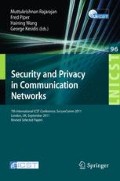Abstract
An optimistic fair exchange (OFE) protocol is an effective tool helping two parties exchange their digital items in an equitable way with assistance of a trusted third party, called arbitrator, who is only required if needed. In previous studies, fair exchange is usually carried out between individual parties. When fair exchange is carried out between two members from distinct groups, anonymity of the signer in a group could be necessary for achieving better privacy. In this paper, we consider optimistic fair exchange of ring signatures (OFERS), i.e. two members from two different groups can exchange their ring signatures in a fair way with ambiguous signers. Each user in these groups has its own public-private key pair and is able to sign a message on behalf of its own group anonymously. We first define the security model of OFERS in the multi-user setting under adaptive chosen message, chosen-key and chosen public-key attacks. Then, based on verifiably encrypted ring signatures (VERS) we construct a concrete scheme by combining the technologies of ring signatures, public-key encryption and proof of knowledge. Finally, we show that our OFERS solution is provably secure in our security model, and preserving signer-ambiguity of ring signatures. To the best of our knowledge, this is the first (formal) work on this topic.
Access this chapter
Tax calculation will be finalised at checkout
Purchases are for personal use only
Preview
Unable to display preview. Download preview PDF.
References
Asokan, N., Schunter, M., Waidner, M.: Optimistic protocols for fair exchange. In: CCS 1997 Proceedings of the 4th ACM Conference on Computer and Communications Security, pp. 7–17 (1997)
Boneh, D., Gentry, C., Lynn, B.: Aggregate and Verifiably Encrypted Signatures from Bilinear Maps. In: Biham, E. (ed.) EUROCRYPT 2003. LNCS, vol. 2656, pp. 416–432. Springer, Heidelberg (2003)
Rivest, R.L., Shamir, A., Tauman, Y.: How to Leak a Secret. In: Boyd, C. (ed.) ASIACRYPT 2001. LNCS, vol. 2248, pp. 552–565. Springer, Heidelberg (2001)
Asokan, N., Shoup, V., Waidner, M.: Optimistic fair exchange of digital signatures. IEEE Journal on Selected Areas in Communication 18, 593–610 (2000)
Dodis, Y., Lee, P.J., Yum, D.H.: Optimistic Fair Exchange in a Multi-user Setting. In: Okamoto, T., Wang, X. (eds.) PKC 2007. LNCS, vol. 4450, pp. 118–133. Springer, Heidelberg (2007)
Huang, Q., Yang, G., Wong, D.S., Susilo, W.: Efficient Optimistic Fair Exchange Secure in the Multi-user Setting and Chosen-Key Model without Random Oracles. In: Malkin, T. (ed.) CT-RSA 2008. LNCS, vol. 4964, pp. 106–120. Springer, Heidelberg (2008)
Bleichenbacher, D.: Chosen Ciphertext Attacks against Protocols Based on the RSA Encryption Standard PKCS #1. In: Krawczyk, H. (ed.) CRYPTO 1998. LNCS, vol. 1462, pp. 1–12. Springer, Heidelberg (1998)
Abe, M., Ohkubo, M., Suzuki, K.: 1-out-of-n Signatures from a Variety of Keys. In: Zheng, Y. (ed.) ASIACRYPT 2002. LNCS, vol. 2501, pp. 415–432. Springer, Heidelberg (2002)
Ateniese, G.: Verifiable Encryption of Digital Signatures and Appliciation. ACM Transactions on Information and System Security 7, 1–20 (2004)
Bellare, M., Goldreich, O.: On Defining Proofs of Knowledge. In: Brickell, E.F. (ed.) CRYPTO 1992. LNCS, vol. 740, pp. 390–420. Springer, Heidelberg (1993)
Camenisch, J., Michels, M.: Separability and Efficiency for Generic Group Signature Schemes (Extended Abstract). In: Wiener, M. (ed.) CRYPTO 1999. LNCS, vol. 1666, pp. 413–430. Springer, Heidelberg (1999)
Barić, N., Pfitzmann, B.: Collision-Free Accumulators and Fail-Stop Signature Schemes without Trees. In: Fumy, W. (ed.) EUROCRYPT 1997. LNCS, vol. 1233, pp. 480–494. Springer, Heidelberg (1997)
Fujisaki, E., Okamoto, T.: Statistical Zero Knowledge Protocols to Prove Modular Polynomial Relations. In: Kaliski Jr., B.S. (ed.) CRYPTO 1997. LNCS, vol. 1294, pp. 16–30. Springer, Heidelberg (1997)
Camenisch, J., Michels, M.: Proving in Zero-Knowledge that a Number Is the Product of Two Safe Primes. In: Stern, J. (ed.) EUROCRYPT 1999. LNCS, vol. 1592, pp. 107–122. Springer, Heidelberg (1999)
Gennaro, R., Krawczyk, H., Rabin, T.: RSA-Based Undeniable Signatures. In: Kaliski Jr., B.S. (ed.) CRYPTO 1997. LNCS, vol. 1294, pp. 132–149. Springer, Heidelberg (1997)
Naccache, D., Stern, J.: A new public key cryptosystem based on higher resudues. In: 5th ACM Conference on Computer and Communications Security, pp. 59–66 (1998)
Okamoto, T., Uchiyama, S.: A New Public-Key Cryptosystem as Secure as Factoring. In: Nyberg, K. (ed.) EUROCRYPT 1998. LNCS, vol. 1403, pp. 308–318. Springer, Heidelberg (1998)
Paillier, P.: Public-Key Cryptosystems Based on Composite Degree Residuosity Classes. In: Stern, J. (ed.) EUROCRYPT 1999. LNCS, vol. 1592, pp. 223–238. Springer, Heidelberg (1999)
Camenisch, J., Shoup, V.: Practical Verifiable Encryption and Decryption of Discrete Logarithms. In: Boneh, D. (ed.) CRYPTO 2003. LNCS, vol. 2729, pp. 126–144. Springer, Heidelberg (2003)
Goldwasser, S., Micali, S., Rivest, R.: A digital signature scheme secrue against adaptive chosen-message attacks. SIAM Journal on Computing 17, 281–308 (1988)
Author information
Authors and Affiliations
Editor information
Editors and Affiliations
Rights and permissions
Copyright information
© 2012 ICST Institute for Computer Science, Social Informatics and Telecommunications Engineering
About this paper
Cite this paper
Qu, L., Wang, G., Mu, Y. (2012). Optimistic Fair Exchange of Ring Signatures. In: Rajarajan, M., Piper, F., Wang, H., Kesidis, G. (eds) Security and Privacy in Communication Networks. SecureComm 2011. Lecture Notes of the Institute for Computer Sciences, Social Informatics and Telecommunications Engineering, vol 96. Springer, Berlin, Heidelberg. https://doi.org/10.1007/978-3-642-31909-9_13
Download citation
DOI: https://doi.org/10.1007/978-3-642-31909-9_13
Publisher Name: Springer, Berlin, Heidelberg
Print ISBN: 978-3-642-31908-2
Online ISBN: 978-3-642-31909-9
eBook Packages: Computer ScienceComputer Science (R0)

